 |

|
|
 |
Special
Report on Selected Side Events at UNFCCC COP-6
published by the International Institute for Sustainable Development
(IISD)
in co-operation with the UNFCCC Secretariat
|
 |
|
|
Events convened on Tuesday 21
November 2000
|
|
The World Energy Assessment
presented by the United Nations Development Programme (UNDP)
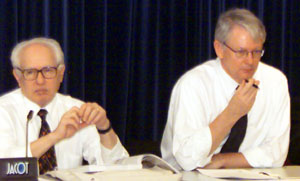 |
| José Goldemberg, WEA, and
Thomas Johansson, UNDP, addressing questions on sustainable energy. |
The United Nations Development Programme (UNDP), the United Nations Department of Economic and Social Affairs (DESA), and the World Energy Council (WEC) convened this event to mark the launch, earlier this year, of The World Energy Assessment: Energy and the Challenge of Sustainability, and to invite COP-6 participants to discuss its contents.
Thomas Johansson, UNDP, explained that the WEA was initiated in 1998 by UNDP, DESA, and WEC, to provide scientific and academic support for international negotiations and debate on sustainable energy. The Assessment analyzes the social, economic, environmental, and security issues linked to energy supply and use, and assesses options for sustainability in each area. He said that the WEA will provide inputs for the ninth session of the United Nations Commission on Sustainable Development (CSD-9) process, in particular to CSD-9 in 2001, "Rio+10" in 2002, and beyond.
José Goldemberg, Chairman of the WEA, recalled the Rio commitments to bring about changes in the world's patterns of energy production and consumption. He urged action to defeat continuing and unsustainable inequities in energy distribution and explained that the WEA follows the premise that energy is an essential component of sustainable development. He outlined the report's contents: the linkages between energy and major global issues; an analysis of the contradictions between current patterns of use and objectives in these areas; a review of energy resources and technology options; and policy actions. He noted that an increased deployment of renewable energy is a feature of the report's scenario for a sustainable energy future.
Eimi Watanabe, Assistant Administrator, Director, UNDP, noted that half of the UNDP's country office projects have energy issues as a component. She voiced concern about the world's "energy divide" and stressed the need to achieve equity.
Nitin Desai, UN Under-Secretary General, DESA, underscored the importance of the WEA as a policy tool that will help to re-focus the global discussion on energy, which is currently immersed in climate change issues. Desai pointed out that the report describes other impacts of energy use on human health and the environment.
Irene Freudenschuss-Reichl, Ambassador Extraordinary and Plenipotentiary of Austria, and co-chair of the CSD's Working Group on Energy, stressed that the WEA reflects the first global discussion on how energy relates to sustainable development.
Discussion: On renewables, discussants raised: current levels of use; uncompetitive costs; competition for land use; the need for the conversion of technologies; and the availability of dedicated biomass supply systems. On nuclear technologies, participants suggested that the potential for nuclear energy to contribute to sustainability has been underestimated, given progress in safety and security standards. On capacity building for sustainable energy, discussants suggested treating energy as the "entry point" for projects and that the UNDP's country offices engage in multi-stakeholder dialogues. On the different scenarios plotting trends in energy use, participants noted the level of investment required to support
renewables.
More information:
First Global Forum on Sustainable Energy, IIASA, Laxenburg, Austria, 11-13 December, 2000; contact: Irene Freudenschuss-Reichl <irene.freudenschuss-reichl@bmaa.gv.at>
WEA: http://www.undp.org/seed/eap/activities/wea/
Contacts:
Arun Kashyap <arun.kashyap@undp.org>
Thomas Johansson <thomas.johansson@undp.org>
Caitlin Allen-Sanchez <caitlin.sanchez@undp.org>
|
|
Employment implications for climate change
presented by the Trade Union Advisory Committee to the Organisation for Economic Cooperation and Development
(TUAC)
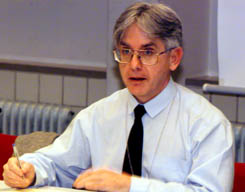 |
| Lucien Royer, TUAC, lays out the common interests of business and labor groups. |
Labor and business leaders met to share views about the impacts of climate change and mitigation measures on employment. Panelists shared concerns about a lack of research on the jobs linkage and expressed disappointment that, in view of the serious social and economic impacts of changes in employment patterns, the negotiation process has not integrated these considerations. There was consensus that employment should be a point of discussion at future COPs. Panelists endorsed the prospects for improved environmental performance without severe negative impacts on employment.
Discussion: Discussants raised serious concerns about job losses in energy-intensive sectors such as coal mining and trucking. The need for capacity-building and human resource development in industrialized countries was discussed, together with the difficulty of implementing effective transition mechanisms.
More information:
TUAC: http://www.tuac.org
The International Confederation of Free Trade Unions: http://www.icftu.org
Business and Industry Advisory Committee to the OECD: http//www.biac.org
International Labour Organization: http://www.ilo.org
Union of Industrial and Employers' Confederations of Europe: http://www.unice.org
Contacts:
Klaus R. Kohlhase <klauskohlhase@compuserve.com>
Jan Corfee Morlot <jan.corfee-morlot@oecd.org>
|
|
SouthSouthNorth Project presentation: CDM pilot projects
presented by the Bangladesh Centre for Advanced Studies
Stef Raubenheimer, SouthSouthNorth Project (SSN Project), welcomed the audience and explained the goals and principles of the project. SSN Project is a collaboration between four southern countries and one northern country to determine, design, and implement a number of prompt-start pilot CDM projects. A central part in this effort is a portal website through which investors and host countries of potential CDM projects can become involved in the development and direction of projects that are sustainable and embody the principle of environmental integrity. Country reports were presented by several participants in the programme. Steve Throne, South Africa, spoke on the project cycle and explained that the project is currently in the scoping phase. Emilio La Rovere, Argentina, explained that each country will select two pilot projects, and highlighted some of the implementing details. SSN Project is being monitored by the HELIO organization. Helene Connor stressed the need for transparency and public participation. Mozaharul Alam, Bangladesh, and Aisyah Sileuw, Indonesia, both stressed the importance of land-use and agricultural activities in designing potential pilot CDM projects.
Discussion: A representative from Indonesia advocated establishing independent national and local boards to evaluate CDM projects. A representative from Brazil stressed the need to share information and experiences.
More information:
SouthSouthNorth Project http://www.southsouthnorth.org
Contacts:
Stef Raubenheimer <stef@southsouthnorth.org>
|
|
Climate change: debt, equity and survival
presented by Friends of the Earth International and Oxfam
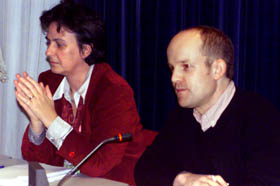 |
| Tricia Feeney, Oxfam, UK, and
Andrew Simms, New Economics Foundation, UK, address the Friends of the Earth International event, "Climate change - debt, equity and survival." |
The underlying questions of justice and equity and the manner in which they affect climate change politics were placed firmly on the table at this event convened by Friends of the Earth International.
 Tricia
Feeney, Oxfam, United Kingdom, spoke about the disproportionate impacts of climate change on the poor and vulnerable populations of developing countries, and reported that G-77/China pleas for justice and equity had met with little response during the climate change talks. She added that funding proposals emerging at COP-6 would only succeed in diverting already-diminished levels of Official Development Assistance (ODA).
Tricia
Feeney, Oxfam, United Kingdom, spoke about the disproportionate impacts of climate change on the poor and vulnerable populations of developing countries, and reported that G-77/China pleas for justice and equity had met with little response during the climate change talks. She added that funding proposals emerging at COP-6 would only succeed in diverting already-diminished levels of Official Development Assistance (ODA).
 Andrew
Simms, the New Economics Foundation, UK, compared and contrasted the conventional debt crisis with the treatment of G-7 countries that have accumulated carbon debts, which he valued at $13-16 trillion per year. He observed that, for example, Washington-based institutions play key roles in both situations. However, whereas the Heavily Indebted Poor Countries have adjustment programmes externally imposed, the carbon debtors undergo no such impositions. On emissions trading, he questioned the legitimacy of claims of entitlement to rights over the atmosphere, by those who plan to engage in trading.
Andrew
Simms, the New Economics Foundation, UK, compared and contrasted the conventional debt crisis with the treatment of G-7 countries that have accumulated carbon debts, which he valued at $13-16 trillion per year. He observed that, for example, Washington-based institutions play key roles in both situations. However, whereas the Heavily Indebted Poor Countries have adjustment programmes externally imposed, the carbon debtors undergo no such impositions. On emissions trading, he questioned the legitimacy of claims of entitlement to rights over the atmosphere, by those who plan to engage in trading.
 Atiq
Rahman, Bangladesh Centre for Advanced Studies, described the climate change process as a "negotiation of power, not of justice." He observed how those who initially denied climate change by citing scientific uncertainty have now rushed to embrace the disputed science of carbon sequestration using sinks. He accused government negotiators of cheating, in full knowledge of the consequences for the Kyoto Protocol.
Atiq
Rahman, Bangladesh Centre for Advanced Studies, described the climate change process as a "negotiation of power, not of justice." He observed how those who initially denied climate change by citing scientific uncertainty have now rushed to embrace the disputed science of carbon sequestration using sinks. He accused government negotiators of cheating, in full knowledge of the consequences for the Kyoto Protocol.
Discussion: Panelists responded positively to a proposal from the floor that developing country representatives should withdraw from COP-6 and form a CDM/JI cartel. Simms recalled the powerful agency of developing countries in Seattle. He suggested that they should withdraw from COP-6 and hold out for equal shares in the global commons, demanding an equitable negotiating framework based on contraction and convergence.
More information:
Friends of the Earth International: http://www.foei.org
New Economics Foundation: http://www.neweconomics.org
Oxfam: http://www.oxfam.org
Bangladesh Centre for Advanced Studies: http://www.bcas.net
Contacts:
<francesm@foe.co.uk>
|
|
Beyond Kyoto: cutting global carbon emissions by 50%
presented by the David Suzuki Foundation
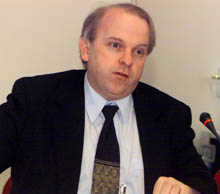 |
| Ralph Torrie reports on his recommendations for a path to a low-carbon future for Canada. The work was commissioned by the David Suzuki Foundation. |
The David Suzuki Foundation convened this event to press demands that delegations at COP-6 go beyond the Kyoto Protocol targets and strive to cut greenhouse gas emissions by 50%, using existing technologies.
Stephen Bernow of the Tellus Institute, United States, warned of major economic and social disruption caused by climate change unless GHGs are cut back by 50% over the coming decades. He called for sufficient emissions reductions to bring about climate stabilization combined with equity to ensure that all people enjoy equal access to ecological space.
Ralph Torrie, Torrie Smith Associates, presented an assessment of end-use energy projections for Canada based on anticipated population and economic growth. Based on current trends, he found that Canada's emissions will continue to grow to 30% above today's levels by 2030. From this base he calculated the changing energy balances and modeled the application of practical, available technologies to reduce energy consumption by 50%.
Brian Hoskins, Royal Commission on Environmental Pollution, United Kingdom, outlined the findings of the Commission's report, Energy - The Changing Climate (2000). The report sets out a number of possible energy scenarios for the United Kingdom over the next fifty years, each designed to bring about a 60% cut in GHG emissions in line with IPCC recommendations.
Sunita Narain, Centre for Science and Environment, India, supported calls for deeper cuts in GHG emissions than those envisaged in the Protocol. She explained that, given the reduced emissions budget available under a global atmospheric stabilization scenario, the current emphasis by negotiators on economic effectiveness would have to shift toward equity and social justice.
Discussion: Discussants raised questions about the viability and desirability of future economic growth, support for the equity and per capita approach within the United States, contraction and convergence, and the view that least cost options are also least benefit options.
More information:
David Suzuki Foundation: http://www.davidsuzuki.org/cop6report.htm
Ralph Torrie Associates: http://www.torriesmith.com
Tellus Institute: http://www.tellus.org
Contacts:
Gerry Scott<gscott@davidsuzuki.org>
Ralph Torrie <rtorrie@torriesmith.com>
Stephen Bernow <sbernow@tellus.org>
Brian Hoskins <hoskins@rdg.ac.uk>
|
|
Briefing on the G8 Renewable Energy Task Force
presented by the Chair of SBI and the G8 Renewable Energy Task Force
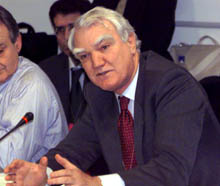 |
| Sir Mark Moody-Stuart, Shell, elaborates on the aims of the G8 Task Force |
Members of the G8 Renewable Energy Task Force presented their mandate, as established at the G8 Summit in Okinawa, 2000. Corrado Clini, Ministry for the Environment, Italy, identified actions to promote a move toward the supply, distribution and use of renewable energy in developing countries and described how the Task Force plans to identify the main barriers to the development of renewable energy. Sir Mark Moody-Stuart, Shell, related that a report will be produced by the group in early 2001. On the contribution of renewable energy to poverty alleviation in developing countries, he acknowledged the high costs involved in establishing new systems. He suggested that micro-credit schemes and the use of multilateral funds could help during the transition phase. Shigeru Oki, Ministry of International Trade and Industry, commented that the group's achievements would be conveyed in the report. Michael Jefferson, Global Energy and Environmental Consultants, stated that in order to gain a balanced overview they aim to assess examples of best practice projects and problem areas.
Discussion: Corrado Clini invited participants to comment on the objectives of the Task Force. Questions reflected concerns regarding the focus on developing countries, the potential conflict between different financial instruments, and a direct request for financial support from a developing country. Sir Mark Moody-Stuart emphasized that prior to creating new financial mechanisms existing systems, such as multilateral funding, should be made more accessible to small-scale projects.
More information:
http://www.renewabletaskforce.org
http://www.g8kyushuokinawa.go.jp/e/documents/commu.html
http://www.aeat-env.com
http://shell.com/royal-en
Contacts:
Corrado Clini <segresiar@tiscalinet.it>
Shigeru Oki <oki-shigeru@miti.go.jp>
Michael Jefferson <jeffers@dircon.co.uk>
Gill Wilkins <gill.wilkins@aeat.co.uk>
Joint UNCTAD / Earth Council capacity building initiative
for the Kyoto flexibility mechanisms
presented by the United Nations Conference on Trade and Development (UNCTAD) and the Earth Council Institute
(ECI).
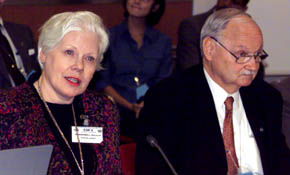 |
| Elizabeth Dowdeswell, GCSI, presents the Global Change Strategies International (GETi) while
Maurice Strong, Earth Council Institute Canada, looks on. |
More information:
http://www.unctad.org/en/subsites/etrade
http://www.gcsi.ca
Contact:
UNCTAD GHG Emissions Trading <ghgemissionstrading@unctad.org>
GCSI <info@gcsi.ca>
|
|
Presentation of National Communications for Guyana, Grenada, Jamaica, and St.Vincent and the Grenadines
presented by the Caribbean Planning for Adaptation to Climate Change (CPACC) and the South Pacific Regional Environment Programme (SPREP), World Bank
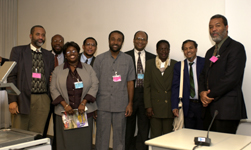 |
| National Communications were presented at COP-6. |
Introducing the event, Ambassador John Ashe, Chair of SBI, commended the achievements of four Caribbean countries on submission of their National Communications. Hutton Archer, the Global Environment Facility, stated that the GEFintends to continue supporting climate change activities in the Caribbean. Elena Martinez, UNDP, highlighted the contribution of the Regional Bureau for Latin America and the Caribbean (RBLAC) in preparing the National Communications. She emphasized RBLAC's continuing support on issues such as adaptation and resource mobilisation in the region. Ambassador Tuilona Eroni Slade, Samoa, Chairman of the Alliance of Small Island States, remarked that early submission of the National Communications represented a milestone in the region's determination to take a leading role in fulfilling FCCC commitments. Michael Zammit Cutajar, FCCC Secretariat noted the positive relationship between the Caribbean and South Pacific regions.
A description of the "Implementation Adaptation to Climate Variability and Change in the Caribbean" project was given by Neville Trotz, CPACC. He outlined components of a planned climate monitoring network.
On National Communications, Leon Charles, Grenada, provided an overview of its GHG inventory, vulnerability and adaptation priorities. He highlighted key areas vulnerable to climate change, including the coastal zone. Concluding, he noted the need to develop appropriate institutional frameworks. Sheik Khan, Guyana, noted that adaptation responses to vulnerability are a priority for national survival. Similar conclusions on vulnerability risks were provided by Clifford Mahlung, Jamaica, and Leisa Perch, St. Lucia and the Grenadines. Mahlung stressed the need for research into the socio-economic components of adaptation. Gisela Alonso Dominguez, Cuba, highlighted the importance of institutional strengthening and the need to assess the cost of adaptation.
Gerald Miles, South Pacific Regional Programme, introduced a World Bank draft report Cities, seas and storms: Managing change in the Pacific Island Economies, which analyzes ways that climate change could impact the economies of the Pacific Islands.
Discussion: Participants discussed commonalities between the Caribbean and Pacific regions. They agreed that mutual benefits could be gained from collaboration on technical issues. Concluding the event, Cornelius Fevrier, Caribbean Community, commended efforts and recommended continued collaboration.
More information:
http://www.gefweb.org
http://www.worldbank.org
Contacts:
Hutton Archer <harcher@worldbank.org>
Leon Charles <cera@caribsurf.com>
Sheik Khan <sheik@guyanaclimate.org>
Clifford Mahlung <clichaja@jamweb.net>
Gisela Alonso Dominguez <gisel@umepnet.inf.cu>
Leisa Perch <lperch@oas.org>
Cornelius Fevrier <cfevrier@caricom.org>
|









